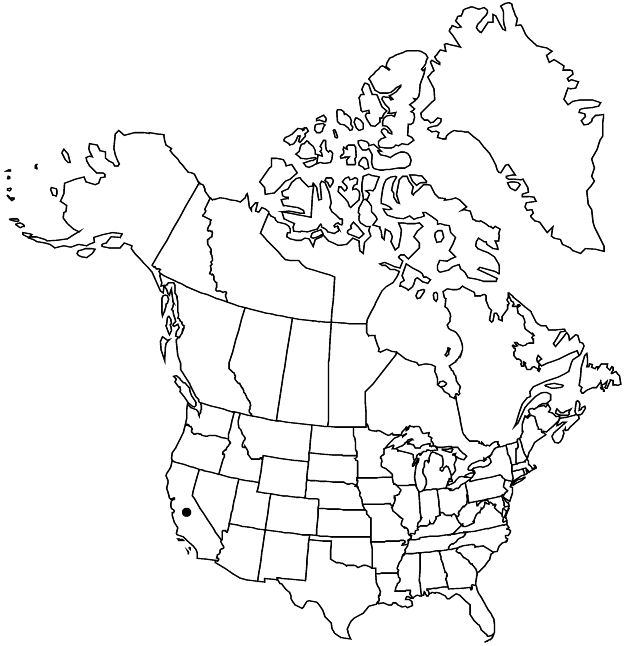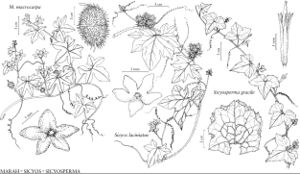Difference between revisions of "Marah macrocarpa"
Leafl. Bot. Observ. Crit. 2: 36. 1910.
FNA>Volume Importer |
FNA>Volume Importer |
||
| Line 31: | Line 31: | ||
|elevation=0–1500(–2100) m | |elevation=0–1500(–2100) m | ||
|distribution=Calif.;Mexico (Baja California;Baja California Sur). | |distribution=Calif.;Mexico (Baja California;Baja California Sur). | ||
| − | |discussion=<p>K. M. Stocking (1955b) enlarged Marah macrocarpa to include M. micrantha Dunn [as M. macrocarpa var. micrantha (Dunn) Stocking], which is known only from</p><!-- | + | |discussion=<p>K. M. Stocking (1955b) enlarged <i>Marah macrocarpa</i> to include <i>M. micrantha</i> Dunn [as <i>M. macrocarpa</i> <i></i>var.<i> micrantha</i> (Dunn) Stocking], which is known only from</p><!-- |
| − | --><p>Cedros Island off the Pacific coast of Baja California, outside of Vizcaíno Bay. But the relatively small flowers and seeds of the latter [staminate flowers 3–6(–8) mm diam. versus 8–13 mm diam.; seeds 12–13 mm versus 15–20 mm] and its apparent geographical disjunction suggest that treatment of M. micrantha at specific rank is justified.</p> | + | --><p>Cedros Island off the Pacific coast of Baja California, outside of Vizcaíno Bay. But the relatively small flowers and seeds of the latter [staminate flowers 3–6(–8) mm diam. versus 8–13 mm diam.; seeds 12–13 mm versus 15–20 mm] and its apparent geographical disjunction suggest that treatment of <i>M. micrantha</i> at specific rank is justified.</p> |
|tables= | |tables= | ||
|references= | |references= | ||
| Line 56: | Line 56: | ||
|publication year=1910 | |publication year=1910 | ||
|special status=Selected by author to be illustrated | |special status=Selected by author to be illustrated | ||
| − | |source xml=https://jpend@bitbucket.org/aafc-mbb/fna-data-curation.git/src/ | + | |source xml=https://jpend@bitbucket.org/aafc-mbb/fna-data-curation.git/src/8f726806613d60c220dc4493de13607dd3150896/coarse_grained_fna_xml/V6/V6_34.xml |
|genus=Marah | |genus=Marah | ||
|species=Marah macrocarpa | |species=Marah macrocarpa | ||
Revision as of 17:47, 18 September 2019
Leaf blades deeply 5(–7)-lobed, 5–30 cm wide. Flowers: sepals (pistillate) deltate, 0.4–0.6 mm, sometimes vestigial; petals (1–)3–10(–12) mm (pistillate) or 5–8(–10) mm (staminate), corolla white, shallowly cupulate to rotate; staminodia scalelike or absent in pistillate flowers. Capsules yellowish green at maturity, short-ellipsoid to broadly ovoid, usually rounded at both ends, sometimes sharply beaked, (5–)8–12 cm, surface densely echinate, spinules rigid, 5–30 mm. Seeds 4–20(–24), usually obovate to oblong-elliptic, sometimes subglobose, not flat at one end, slightly compressed, 15–20 mm. 2n = 32, 64.
Phenology: Flowering (Jan–)Mar–May.
Habitat: Pinyon-juniper woodlands, Joshua tree-pinyon transition zones, coastal sage, chaparral, oak woodlands, rocky hillsides, riparian woods and thickets, stream bottoms, disturbed sites, roadsides
Elevation: 0–1500(–2100) m
Distribution

Calif., Mexico (Baja California, Baja California Sur).
Discussion
K. M. Stocking (1955b) enlarged Marah macrocarpa to include M. micrantha Dunn [as M. macrocarpa var. micrantha (Dunn) Stocking], which is known only from
Cedros Island off the Pacific coast of Baja California, outside of Vizcaíno Bay. But the relatively small flowers and seeds of the latter [staminate flowers 3–6(–8) mm diam. versus 8–13 mm diam.; seeds 12–13 mm versus 15–20 mm] and its apparent geographical disjunction suggest that treatment of M. micrantha at specific rank is justified.
Selected References
None.
